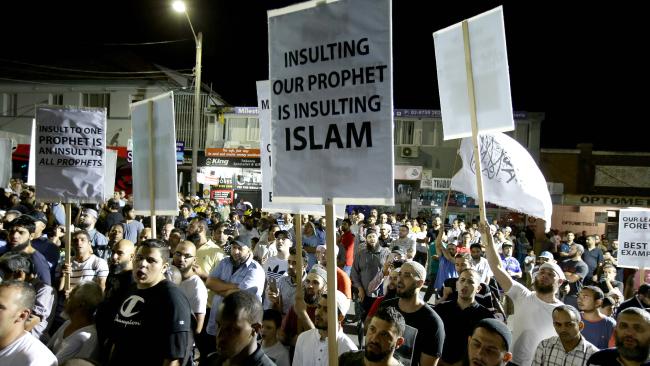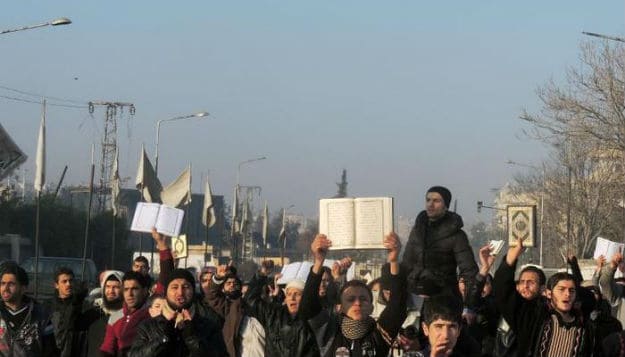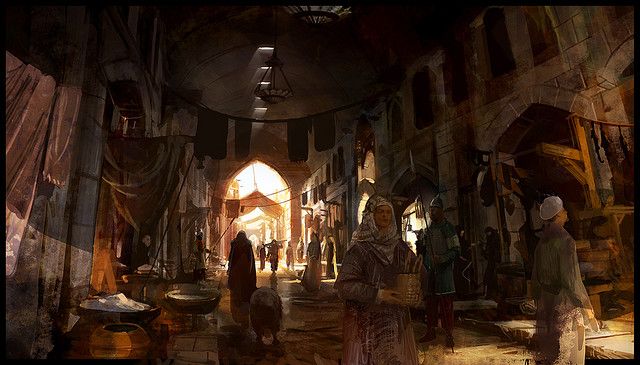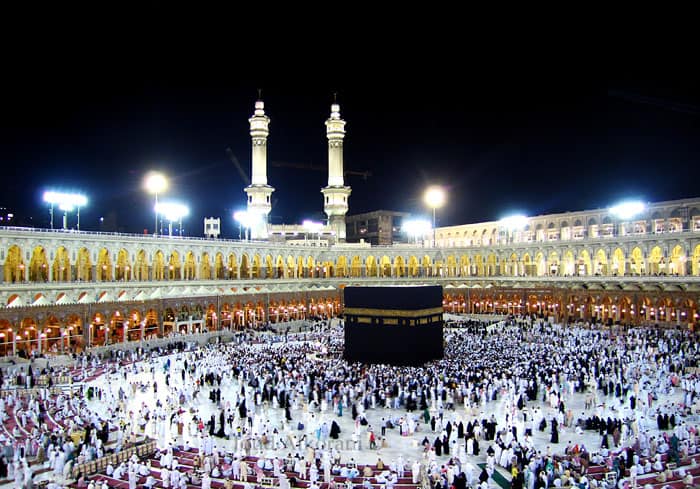What’s the point of a protest? What’s the point of “just making noise, shouting slogans and delivering rousing speeches”? In the context of the present condition of the ummah generally and Aleppo specifically, some have asked these questions in response to rallies, protests and demonstrations that are being held. What are some responses to these questions and what indeed is the point of holding protests?
The people asking these questions contend that protests don’t achieve anything practically. They won’t stop war or oppression that one is speaking against. They won’t help those being killed or alleviate their condition in the least. So what’s the point?
Well, the points are numerous. Individually, each of these points are important, whether from the perspective of creating political currents, or fulfilling the Islamic obligation to enjoin the good, or both. Taken collectively, however, they make for a compelling case. So here are some points to consider about why protests are not just meaningful, but an important contribution on relevant matters when done correctly and by delivering the right message:
1. Protests help raise awareness about an issue in a collective and public manner.
By being in the open, they garner more attention towards issues than individual statements would. Through their being advertised, talked about, reported on, posted to, far more people come to know about the issue they are addressing, as well the angle the protesters take in relation to it than would otherwise be possible.
2. Breaking the fear or inability to act that silences communities.
In situations of difficulty where hope seems lost, protests are a style of collective action that force people to move together behind a united message in significant numbers. Especially where inaction and silence dominated beforehand, they represent a significant “breaking of the shackles” and an end to inaction and complicit quietness.
Where people individually may not have had any way to channel their sentiments, they find an outlet in this collective medium.

An image from one of the early protests of the Syrian Revolution in Homs. Indeed, protests start revolutions!
3. Giving a voice and expression to the truth, which if kept hidden gives way to falsehood over time.
False propaganda gains force of truth over time if not contested, and particularly in situations of modern conflicts where oppressors have entire state apparatuses to promote their message, it is very easy for the truth to be diluted if it isn’t decisively and publicly advocated. Protests do just this: they publicly assert the truth. This is often propelled further by the media that covers them, but most importantly, those who participate take the message further still to their families, acquaintances, etc, ensuring that the public avowal of truth has ripples far beyond the moment.
4. The Enjoining of good and forbidding of evil, one of the most virtuous deeds in Islam.
This is a point that barely needs explication, for indeed enjoining the good and forbidding the evil are among the most important obligations in Islam.
Allah (swt) says in Surat aali-‘Imran (verse 110):
You are the greatest nation raised up for mankind, you enjoin the good and forbid the evil and you believe in Allah.
Imam Ibn Hajr Al Asqalani said about this verse: “The reason for the Muslims being the best nation from mankind was due to Muslims expanding the authority of Islam and then embracing Islam in their multitudes”.
Imam Al Qurtubi said about this verse: “Allah made enjoining the ma’roof and forbidding the munkar differentiate between the Muslims and the Munafiqeen! Thus it indicates that the most specific description of the believers is enjoining the good and forbidding the munkar and at the head of which is the da’wah to Islam.”
When speaking about the Aqeedah of the Salaf, Imam Al Sabooni wrote that it was to “…to concern themselves with the affairs of the Muslims, to enjoin the good and forbid the evil…to exhort one another to patience”.
Imam Al-Nawawi said: “Hisbah (enjoining good and forbidding evil) is a great issue which lies at the heart of all matters. If evil practices become abound, Allah’s punishment will be visited upon the pious and the wicked alike. And if they fail to forbid the transgressors to do evil, Allah will make His punishment spread to encompass all the people”.
And to add to this, it moves Islamic advice (naseeha) beyond the dimension of personal suggestions to follow fiqh, which are important, but into another realm that can also nobly address groups, societies and nations.
5. Publicly calling others to the truth, which has greater projection than individual invitation.
Protests, in their organisation and execution, propel a certain stance on a given issue. They are in this respect an invitation to that stance, since no one backs a protest whose fundamental message they disagree with. In this regard they invite people to consider the merits of that particular stance, to assess it, and often lead to discussions between people, groups and populations generally as to the strength of those stances.
At their highest, they are a form of da’wah to a certain position, and where they are conducted in defence of a truthful position, they are of course a form of da’wah to the grand truths of this world.
6. Accounting tyranny, oppression and their perpetrators; the path to the peak of martyrdom.
The Prophet said (ﷺ):
The masters of martyrs is Hamzah and the man who stood facing a tyrant ruler, gave him the correct advice and the ruler killed him [Reported by al-Haakim].
Even where one is not martyred when speaking truth to the oppressor, the act of standing to say the truth is a noble one and a courageous one, especially when most are silent and afraid to speak. In that respect, protests are often a form of speaking truth in the face of tyranny and oppression.
7. Paving the way for future material change through the influence of public opinion.
Protests are collective actions that help build opinion in a certain direction. They influence those who come to them and hear a certain message for the first time. They influence entire families and they influence through their coverage and propagation those who might not have even been present. In this regard, and through the publicity they receive, they help build a longer term public opinion that is crucial to creating the conditions for change in our ummah: conditions which are inherently only created over the long term. In this regard, protests can form the foundations of
In this regard, protests can form the foundational sentiments for long-term revival in our communities and ummah.
8. Offering the oppressed moral support by showing them that they are not alone.
In this day and age of social media connectivity, no message or activity stays “local”. Through the power of social media people on the other side of the world find out about protests in the most obscure locations. One can broadcast and show one’s “solidarity” with an oppressed set of people even from far away distances. In the context of the Muslim world this has a massive impact: our brothers and sisters in the heart of the Muslim world, often the subject of untold oppression, see their brothers and sisters supporting them and feel empowered, connected, loved and inspired.
Indeed, in the context of the Syrian revolution and other uprisings, one of the key messages that people in the Muslim world fed back to activists in the rest of the world, was how much the support of their brothers and sisters overseas meant to them. If this isn’t reason enough on its own to conduct larger scale public activities like protests, then it may well be argued that our hearts are dead to what our brothers and sisters want to hear from us in the heart of the difficult conditions that is the present Muslim world!
 Sisters protest against Aleppo massacres in Sarajevo, Bosnia
Sisters protest against Aleppo massacres in Sarajevo, Bosnia
9. Being the voice of the oppressed where they have been made voiceless.
Finally, at a time when our oppressed brothers and sisters cannot channel their voices due to the lack of outlets they have, those who can protest in various places around the world have the ability to be a voice for them. Whether it be through the use of social media and broadcasting such protests through social media, or through the coverage such causes receive in more traditional media, the plight of the oppressed is brought to the attention of the world. And not just the world, but also local communities in, say, the West, that might have otherwise have been oblivious to the realities facing Muslims elsewhere, and realities they would not have found out about without the publicity and public advertising, awareness raising etc that such protests require.
As such, through both their merely being held, but also through their coverage, protests become a form of creating a voice for the voiceless.
Each of these is a worthy deed on its own. So what of many of them combined, or all of them together?!
A protest is, in essence, a form of public expression, and as such it seeks various ends, such as those listed above. The problem with the line of thought that finds protests pointless because they don’t directly result in some material change is that it is measuring an action by the wrong criteria. If material change were possible, there would be no need for a protest. Indeed, he who can achieve direct change but merely protests reneges on his duty. The role of protests arises precisely where direct material change is not possible.
The hadith of the noble Prophet (ﷺ) is clear in this regard:
Whoever sees an evil, let him change it by his hand, but if he is not able then by his tongue…” [Muslim].
Indeed, this line of thinking is in complete discord with the noble Prophetic model and instruction.
The Prophet (ﷺ) names Umar (ra) al-Faruq [distinguisher of truth from falsehood] precisely because of his public airing of the truth. He pushed to go out and publicly express the deen, so the Sahaba did so: a procession of forty in two rows marched to the Ka’bah as a public expression of the new deen.

A massive protest in Istanbul, Turkey, in support the revolution in Syria and Aleppo specifically
Abdullah ibn Masud (ra) goes to the Ka’bah to recite Surat al-Rahman openly and loudly to Quraysh, knowing full well that the result would be physical violence against his person.
Abu Bakr (ra) prefers to pray and recite Qur’an openly in his front yard so that people can hear him as opposed to inside his house, even when the consequence is that he loses protection and is now open to attack by Quraysh.
Indeed there are too many such instances.
To these instances and their brave instigators, we might dare ask the same: what’s the point? What’s the point of a march or reciting Qur’an in public or praying in the open? Especially when some form of harm is likely? The point is that the public expression in and of itself is powerful to the end of all the things noted above.
The noble Prophet (ﷺ) himself is emphatic:
If you see my Ummah in dread of saying to an oppressor ‘You are an oppressor!’, then she has been farewelled [Hakim]
meaning that Allah has left them to their own, taking away His support.
By the one in whose hand is my soul! You will enjoin the good and forbid evil, or else Allah will soon send upon you a punishment from Him, then you will call upon Him but He will not respond to you [Tirmidhi].
Not only, thus, do protests have a point, they are virtuous deeds pleasing to Allah, the exalted, if we do so with the right intention, manner and message.
This article has been adapted from a status made by brother Uthman Badar on Facebook.
![]()















